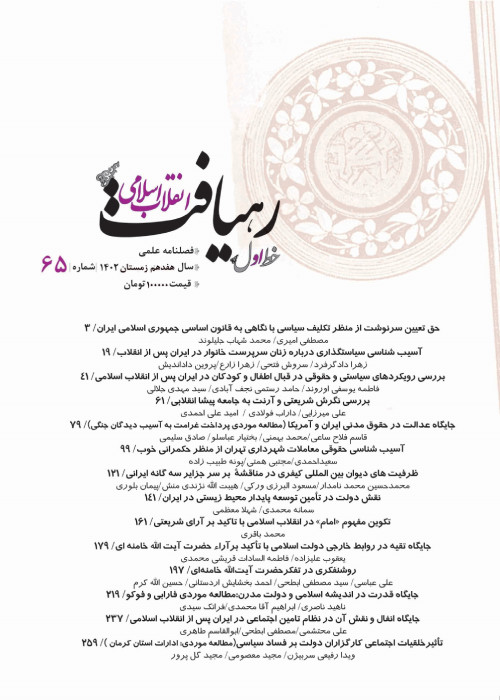Ijtihad and socio-political developments with emphasis on the theory of social mobilization; A Case Study of the Period of Ayatollah Behbahani to Imam Khomeini
Political and social developments are always related to the systems of thought and thought in different societies. This means that intellectual, cultural factors and the resulting developments can affect the political and social situation, political systems and institutions. The intellectual developments are most noticeable in the areas of religion and the interpretation that is made of it. Intellectual developments in the jurisprudential system are known as ijtihad, which reached its peak during the confrontation between the fundamentalists and the Akhbaris and continues to this day. However, the prevailing trend of the researches is that the intellectual and political developments influenced by the West in the field of thought and politics have been the cause of the shift of Shiite jurisprudence from news to principled jurisprudence, but in the present article, the author examines the historical course. The change in Shiite jurisprudence and the intellectual and political changes in Iran leads to the opposite conclusion that exactly the changes in Shiite jurisprudence from news to principles have created the ground for Iran's intellectual and political change. The process of evolution of jurisprudence begins with Vahid Behbahani and his principled approach and culminates with the absolute authority of the jurist and the emphasis on the two elements of time and place as an inseparable part of jurisprudence in Imam Khomeini's approach. This trend is symmetrical with the intellectual and political developments in Iran, which begin with constitutionalism and culminate in the Islamic Revolution. The transition from the news approach to principles has attracted the attention of Shiite jurisprudence to the political and social spheres, including its results, the formation of initial plans for political and social movements, attention to inadequacies and non-religious political inefficiencies, attention to rulings and orders. Jurisprudence has been to design a desirable political society as well as to fight against injustice, poverty and corruption. The culmination of this evolution was the formation of the Islamic Revolution of Iran under the leadership of Imam Khomeini. The author's method is descriptive with a historical approach and uses Charles Tilly's "social mobilization" model as the basis of research.
- حق عضویت دریافتی صرف حمایت از نشریات عضو و نگهداری، تکمیل و توسعه مگیران میشود.
- پرداخت حق اشتراک و دانلود مقالات اجازه بازنشر آن در سایر رسانههای چاپی و دیجیتال را به کاربر نمیدهد.



